The new LNG import terminal has 'failed' to increase the overall supply of re-gasified LNG (RLNG) to the national grid.
State-owned Petrobangla, however, started counting 'capacity payment' charge of around US$ 200,000 per day from the day after commissioning of the second LNG (liquefied natural gas) import terminal owned by Summit Group, a senior Petrobangla official said.
Energy experts termed it a glaring example of 'mismanagement' and 'poor' planning.
The two LNG terminals owned by Excelerate Energy and Summit Group re-gasified around 534 million cubic feet per day (mmcfd) of LNG in total as of May 05, 2019, according to Petrobangla.
Both the FSRUs re-gasified around 537 mmcfd of LNG on May 4 while 543 mmcfd on May 3, 534 mmcfd on May 2, 565 mmcfd on May 1, 563 mmcfd on April 30 and 533 mmcfd on April 29, Petrobangla statistics showed.
The country's second LNG import terminal, owned by Summit Group, started operation on April 29, doubling the country's total LNG re-gasification capacity to 1,000 mmcfd.
Excelerate Energy's FSRU -- Excellence - re-gasified alone around 533 mmcfd of LNG on April 28, according to Petrobangla.
Officials said with the existing pipeline network, some 600 million cubic feet per day (mmcfd) of LNG can be evacuated in maximum as against total 1000 mmcfd capacity of two FSRUs.
The state-owned Petrobangla would have to pay 'capacity charge' for around 400 mmcfd until infrastructure readies, the official added.
The construction of two major pipelines -- one 42-inch 90-km pipeline from Moheshkhali to Anwara and another 36-inch 181-km Chattogram-Feni-Bakhrabad -- is required to evacuate an agreed quantity of LNG, which is around 1,000 mmcfd.
State-run GTCL (Gas Transmission Company Ltd) is responsible for building the gas transmission pipelines in the country.
According to the deals, Petrobangla is required to pay the US firm around $237,000 (Tk 20.14 million) a day -- no matter it re-gasifies the agreed quantity of 500 mmcfd of LNG or less.
For Summit's FSRU, Petrobangla would have to pay around $ 217,000 per day.
Both the deals are on take or pay basis, meaning Petrobangla would have to pay the amount after commissioning of the FSRUs, no matter it re-gasifies or not.
Both the FSRUs are designed to re-gasify around 500 mmcfd, which is the agreed quantity between Petrobangla and contractor.
Earlier, the delay in the construction of a 30-kilometre 42-inch diameter Anwara-Fouzdarhat gas transmission pipeline forced Petrobangla to pay the capacity charge to the contractor of the country's first LNG terminal.
Petrobangla started re-gasifying around 100 mmcfd of LNG, which is one-fifth of the capacity, from the first LNG terminal from August 18, 2018.
Bangladesh started commercial operation of its maiden FSRU on August 18, 2018 after importing the first LNG -- with Excelerate's commissioning cargo on April 24, 2018.
The Excellence got connected to the sub-sea pipeline network on August 05, and commenced injecting first re-gasified LNG into the pipeline network on August 12.
Technical issues and rough sea during the June-August south-western monsoon also kept it stranded off the south coast of Chattogram for months.
"It reflects massive mismanagement in the energy sector," Prof M Tamim, pro-vice-chancellor of Brac University, said.
"I don't know why the authority allowed operation of the second LNG terminal before completion of necessary pipeline," he said.
The authorities should have a responsibility before draining out public money, he added.
Badrul Alam, an energy expert and professor of Geology Department at Dhaka University, demanded proper investigation 'over this sort of poor and faulty planning' and punishment for offenders.
Bangladesh is currently importing lean LNG from RasGas of Qatar and Oman Trading International or OTI of Oman under term deals.


